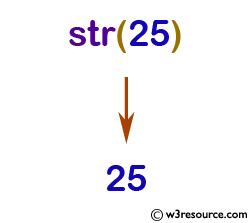Python: str() function
str() function
The str() function is used to convert the specified value into a string.
Version
(Python 3.2.5)
Syntax:
str(object='') str(object=b'', encoding='utf-8', errors='strict')
Parameter:
| Name | Description |
|---|---|
| object | Any object. |
| encoding | The encoding of the given object. Default is UTF-8. |
| errors | Specifies what to do if the decoding fails. |
Return value:
A string.
Example: Python str() function
print(str(15))
Output:
15
Example: Python str() function
# bytes
x = bytes('cöde', encoding='utf-8')
print(str(x, encoding='ascii', errors='ignore'))
Output:
cdePictorial Presentation:

Python Code Editor:
Previous: sorted()
Next: sum()
Test your Python skills with w3resource's quiz
